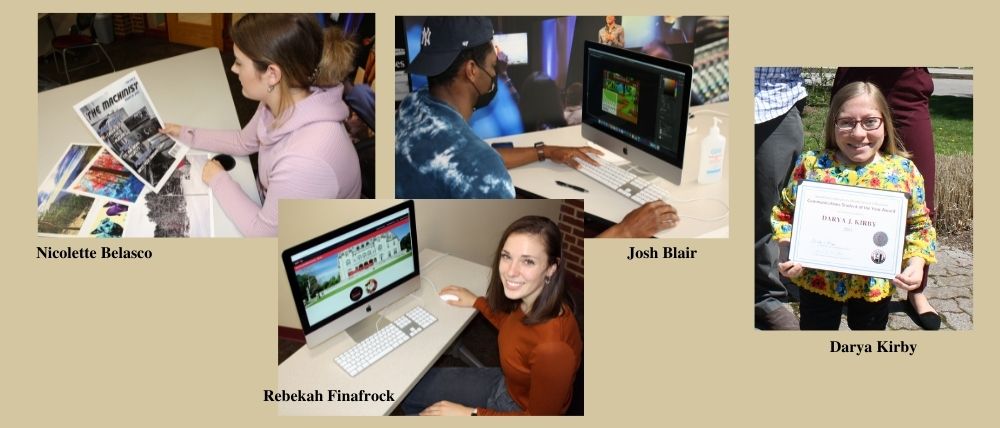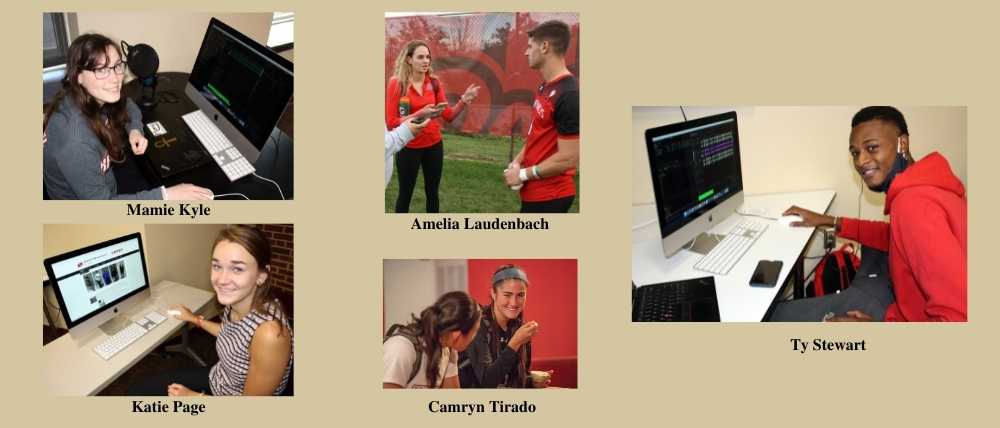Comm students uncover Flourishing Moments during pandemic 2021
Students Focus on “Flourishing Moments” in Reflections on Pandemic Experience
Students in the Communications Program’s capstone course, Multiplatform Storytelling, completed a three-part oral history project titled “Documenting the Pandemic” during the spring 2021 semester.

In Part 1 of the assignment, the 20 students shared their pandemic experiences, using the camera as their primary story-telling tool. They prepared a set of photos with accompanying text that painted a picture of their families’ lives since the onset of the pandemic.
For Parts 2 and 3 of the project, the class members conducted two qualitative interviews: one with a classmate and another with a family member. The students and family members delved more deeply into their pandemic experiences in these recorded and transcribed interviews.
Portions of these oral histories will be archived at the University and preserved for future reference.

One of the most significant take-aways from the students’ collective work on this project was the positive attitude and spirit of appreciation that flowed through the submissions.
Psychologists often use the term “flourishing” to describe someone’s overall well-being. This includes a person’s emotional, mental, and physical states. Epidemiologist Tyler VanderWeele recently told The New York Times that someone who is flourishing is “living the good life.”
The opposite of flourishing is “languishing.” This describes someone who is dispirited, someone whose emotions are dulled. Often a person who is languishing feels stagnant and lacks motivation. Most of us can probably recall moments over the last year-plus when we were languishing.
When considering overall well-being, it is essential to understand that flourishing does not mean being at our best.
“People think that to flourish, they need to do whatever their version of winning the Olympics is, climbing a mountain, or having some epic experience,” said psychologist Adam Grant in an interview with The New York Times.
This, of course, is not the case. People most often flourish during life’s little moments.
The experiences shared by our Communications students in this oral history project focused, by and large, on these types of small, flourishing moments. Below are several excerpts from their submissions highlighting these moments and their prevailing spirit of thankfulness amid uncertainty.
Nicolette Belasco/Junior/Pittsburgh, Pennsylvania
“Whenever we found out the whole semester would be online and that there was no in-person instruction, I took this as my sign to get into a better routine. I would complete my classes for the day, do my homework and assignments, and then take the rest of the day to try something new. I picked up bike riding over quarantine because the weather was starting to get really nice, and it was relaxing. I also started hiking, which is one of my favorite things to do now. If it wasn’t for quarantine, I don’t think I would have found out how much I really like being outdoors.
“I felt like this time transformed me. I started to realize what I wanted to do with my career, what I valued most in my life, and what made me truly happy. This was something that would have never surfaced if it wasn’t for the pandemic.”
Josh Blair/Senior/Matteson, Illinois
“Early in the pandemic, I took on biking as a hobby. It was something to look forward to and got me out of the house. It was therapeutic to have some time out of the house to myself. I thank God for that time. It allowed me to have some peace in the storm.
“I also started hiking. It’s something that I was able to do without seeing too many people. It kept me sharp and peaceful. It allowed me to spend time with my brother. One good thing that came out of the pandemic was that many people slowed down. So often, people rush through life, just checking boxes. This pandemic forced us to focus more on the little moments.”
Rebekah Finafrock/Senior/Fairfield, Pennsylvania
“I’m definitely a different person from a year ago in the way I view things and other people. I don’t know if it’s the timing that I’m a senior this year, but I’ve gotten closer with people. Our bonds have been growing stronger. I think a lot of people, in general, are not taking people for granted. We’re spending quality time with each other and trying not to be on our phones as much. I think it’s made everybody appreciate each other more.”
Darya Kirby/Junior/Summerhill, Pennsylvania
“I think the pandemic has made all of us stronger, whether it’s from businesses to relationships, to personal growth. The pandemic was good for my personal growth. It made me stronger. It opened my eyes. I wasn’t aware of, or necessarily thought of, things that weren’t affecting me – things like the Black Lives Matters Movement or (decisions) affecting small businesses. It definitely opened my mind and (reminded me) that the world does not revolve around me.”
Mamie Kyle/Senior/Liberty, Pennsylvania
“You can’t really predict when something like this is going to happen. You can’t really predict how you’re going to act or how it’s going to affect, literally, everything around you - the country, the world. But you have to look for the small victories and the little silver linings. You can learn from any situation, no matter how awful it is. You can find different things to learn from.”
Amelia Laudenbach/Junior/Canberra, Australia
“We were at the Minnamurra Inlet, where dad and I had gone for a swim. The water was freezing. We come out, and some of the old locals are sitting there, enjoying the sun. They’re like, ‘is it cold?’ because we were shivering and had goosebumps, and I said, ‘yeah, it’s freezing.’ One of them said, ‘oh, I choose to live my life by nourishment and not punishment.’ I was like, ‘that’s an interesting way to look at things.’
“We could see this period of quarantine as punishment, but I saw it as a chance to nourish myself. So I nourished my mental health through creative processes and my physical health through at-home workouts. I took time to step back and focus on things that I wouldn’t be able to in regular life. That really changed my perspective. My dad would always come in and wake me up at 8 a.m. with a coffee and say, ‘you need to get up; it’s going to be good for you. You need to get up, get active, go for a walk, just do something.’ Moving through (quarantine) as a family was important.”
Katie Page/Senior/Columbus, Ohio
“I’m fortunate to be close with my family members. I have two younger siblings, and we’re all pretty close in age. We were all able to hang out, play games. I also had an internship during the pandemic, so that kept me busy. It was able to give me structure and a routine. I found a lot of comfort in doing things for my mental health, like going for walks, running, and doing workouts in my backyard. My family and I played cornhole a lot. Walking the dog was fun. I also love to craft, so I did a lot of cross-stitching and tie-dyeing. It made me appreciate my family because they were there to lean on.”
Ty Stewart/Senior/Silver Spring, Maryland
“I appreciate things more. Time is valuable. Do not take stuff for granted. I realize you need to live in the moment. Try to seek the good out of a bad situation. It’s really the application of mindset and actions. I’m learning not to hold things in. I’m trying to be more transparent and more trusting of people. I feel like doing that relieves stress. The pandemic has been eye-opening for me. It made me a better person, and it has helped me continue to grow.”
Camryn Tirado/Senior/Deptford, New Jersey
“I learned not to take anything for granted. Before the pandemic, I was definitely less grateful in certain aspects of my life. When the pandemic started and as it went on, I became more grateful for the smallest things in life. You can’t take your life for granted, no matter how good or bad the circumstances get.”
Pat Farabaugh is an Associate Professor of Communications at Saint Francis and the author of “An Unbreakable Bond: The Brotherhood of Maurice Stokes and Jack Twyman.” He teaches the Communications Program’s senior capstone course.